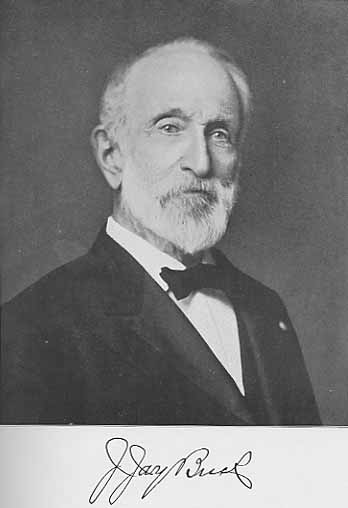
J. Jay Buck, of Emporia, Kan., a veteran of the great Civil war, who for forty years has been a member of the Lyon county bar, and has established during those years a state reputation as an able, conscientious, and successful lawyer, is a native of Dutchess county, New York, born Aug. 14, 1835, his parents being Israel and Jane Eliza (Green) Buck. Israel Buck, a birthright Quaker, was born in Grand Island, N. Y., and in May, 1836, moved to Michigan, which was then yet in the territorial epoch of its history and was almost wholly undeveloped. He was a farmer by vocation, and his task of literally hewing out a farm from the virgin forest was that of the average Michigan pioneer of that day. He developed his farm into a very valuable holding, and was not only recognized as one of the best farmers of the state but became well known and influential in the public life of Michigan, where he died. He was the son of Levi Buck, also a native of New York, who spent his entire life there and was engaged in farming. John R. Green, the maternal grandfather of J. Jay Buck, was likewise a native of New York, where he spent his entire career as a farmer. J. Jay Buck completed his literary education in Hillsdale College, Hillsdale, Mich., where he graduated in 1856, and immediately afterward entered the law office of Christopher J. Dickenson, under whose able guidance he was prepared for his admission to the bar. He then engaged in teaching a few years in Michigan, but 1862 found him in Wisconsin, where he enlisted in Company A, Thirty-second Wisconsin infantry, which was mustered in at Oshkosh, Sept. 25, 1862, left the state Oct. 30, and reached Memphis, Tenn., on Nov. 3. It saw active service from that time until the close of the war, the earlier part of its service being in Tennessee and Alabama. It then joined Sherman's army in the siege of Atlanta, where it was constantly under fire from July 20 until Aug. 24, 1864, and was in the battle of Jonesboro. In November, 1864, it joined the march toward Savannah and remained in that vicinity, until Jan. 3, 1865, when the campaign of the Carolinas was commenced. It joined in the general movement toward Richmond, participated in the grand review at Washington, and was mustered out at Crystal Springs, June 12, 1865. Mr. Buck's brigade commander, Colonel Tillson, said that since the war commenced he "had not seen a body of men that, in point of discipline and efficiency, excelled, and a very few that equaled, the Thirty-second Wisconsin." Mr. Buck served as judge-advocate under Gen. L. H. Rousseau, to whom he gave valuable service as an attorney, having had charge of thirteen courts-martial and five military commissions. At the close of the war he located in Clarksville, Tenn., where he bought property, published a Republican newspaper, and practiced law several years. In April, 1870, he removed to Emporia, Kan., where he opened a law office and took a partner, the firm name being Buck & Cunningham. This partnership was dissolved later, after which Mr. Buck practiced alone. He is a very able lawyer; his briefs always indicate deep thought, care and wide research in their preparation, cogent and logical in form; and his language, though plain and simple, has that fundamental quality which makes it the best possible garb for the idea he seeks to convey. He has practiced not only in the lower courts, but also in the state supreme court and the United States supreme court. He prepared the brief for the appeal of the famous cattle case of Charles Huber against the Missouri, Kansas & Texas Railway Company, which was tried in the United States supreme court in 1898, and resulted in a decision which required the railroad company to pay $47,000 to Mr. Huber and other parties losing by the Texas cattle fever, for cattle that died. Mr. Buck is a Republican in politics and has served as county attorney of Lyon county and three terms as a member of the state legislature.
On March 31, 1860, Mr. Buck married Mary H. Tichenor, daughter of Joseph Tichenor, a native of New York but later a resident of Michigan, where he engaged in farming and where he died. Mr. and Mrs. Buck and their one son, L. Jay Buck, who is cashier of the Emporia National Bank, are all communicants of the Episcopal church. Mr. Buck's fraternal memberships are with the Masonic order and the Independent Order of Odd Fellows, he being one of the oldest Masons in Emporia, both in point of age and of membership. He holds a prominent place in these orders in Kansas, having been grand master of the Odd Fellows in 1877, grand master of Masonry in 1884, and grand commander of the Knights Templars in 1887.
Pages 784-785 from volume III, part 2 of Kansas: a cyclopedia of state history, embracing events, institutions, industries, counties, cities, towns, prominent persons, etc. ... / with a supplementary volume devoted to selected personal history and reminiscence. Standard Pub. Co. Chicago : 1912. 3 v. in 4. : front., ill., ports.; 28 cm. Vols. I-II edited by Frank W. Blackmar. Transcribed December 2002 by Carolyn Ward. This volume is identified at the Kansas State Historical Society as microfilm LM195. It is a two-part volume 3.
![]()
TITLE PAGE / LIST OF ILLUSTRATIONS
INTRODUCTION
A | B | C | D | E | F | G | H | I
VOLUME II
TITLE PAGE / LIST OF ILLUSTRATIONS
J | K | L | Mc | M | N | O | P | Q | R | S | T | U | V | W | X | Y | Z
VOLUME III
BIOGRAPHICAL INDEXES
